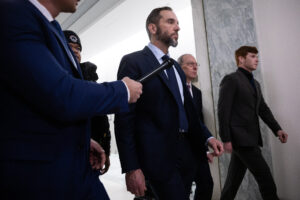The Dictatorship
Trump and Bukele must think Americans are either ignorant or incredibly gullible

Late Thursday, a unanimous Supreme Court ordered the Trump administration to “facilitate” the return of Kilmar Abrego Garciathe Salvadoran citizen who was in the United States legally but illegally rendered to a Salvadoran prison over what the administration admits was an “administrative error.” Now the same administration that claims the U.S. can take over Greenland and Canada is pretending it can’t dictate policy to another country. “If they want to return him, we would facilitate it, meaning provide a plane,” Attorney General Pam Bondi said Monday during an Oval Office meeting between Trump and Salvadoran President Nayib Bukele. “That’s up for El Salvador if they want to return him,” she argued.
Bukele, for his part, completed the shell game: “I don’t have the power to return him to the United States,” he insisted. But the U.S. can do far more than “provide a plane” to “facilitate” Abrego Garcia’s return. When the White House asserts it is out of ideas for how to bring him back, don’t believe it.
The White House has deployed a wide range of tactics to secure the compliance of those over which it has little direct or legitimate authority.
The Trump administration has attempted — not very successfully — to use on-again-off-again tariffs to try to bend foreign governments to its will. It has attacked law firms to punish them for past perceived slights of the president, to get them to refrain from suing the administration in the future and to force them to serve the policy goals of the administration. It has slashed billions of dollars in contracts with and grants to America’s most prestigious research universities for not serving the Trump administration’s interests.
In other words, the White House has deployed a wide range of tactics — mostly on dubious legal grounds — to secure the compliance of those over which it has little direct or legitimate authority. As the Trump administration suddenly draws a blank on how it could pressure the Salvadoran government to return Abrego Garcia, then, no one should take such claims seriously.
If the administration’s position is that once anyone is outside U.S. territory and custody, courts cannot order their return — no matter how illegal or unconstitutional that rendition — what would stop the federal government from sending anyone, citizen and noncitizen alike, to a prison camp in some other part of the world without recourse? To put it bluntly: nothing. Under this logic, if the administration could do this to this individual, literally no one is safe, provided they are whisked out of U.S. government custody and control.
With its ruling Thursday, the Supreme Court rejected this sort of race-to-the-border logic. Now that the Supreme Court has stepped in and ordered Abrego Garcia’s return, it is up to the Trump administration to comply. But the court’s unanimous order also leaves the White House a little wiggle room. The court found that one aspect of the lower court’s directive, that the administration “effectuate” Abrego Garcia’s return, was “unclear, and may exceed the District Court’s authority.” It directed the lower court to “clarify” that directive, “with due regard for the deference owed to the Executive Branch in the conduct of foreign affairs.” At the same time, it also found that the administration “should be prepared to share what it can concerning the steps it has taken and the prospect of further steps.”
If the administration, and the trial court, are looking for some guidance on what steps the government could take to “effectuate” Abrego Garcia’s return, they need not look past the free-wheeling actions of the administration over the last month for some tactics for achieving that goal. The playbook from which it is drawing its current tactics is full of ways to bring Abrego Garcia home. And it won’t take much.
The U.S. government could pressure the Salvadoran government in any number of ways, like it has other nations and institutions.
The U.S. pays El Salvador to detain deported migrants like Abrego Garcia. The administration could threaten to cut those funds or suspend future transfers unless he is returned. It could increase tariffs. It could assert the power to increase tariffs on other countries that do business with El Salvador. It could cut foreign aid to the country. Indeed, the U.S. government could pressure the Salvadoran government in any number of ways, like it has other nations and institutions. If it even hinted that it might consider any of these tactics, Abrego Garcia would be on the next flight home. That it refused to even try speaks volumes.
In the long run, as at least some members of the court recognize, any judicial ruling short of ordering the Trump administration to secure the return of Abrego Garcia will simply encourage the federal government to deport individuals — noncitizens and citizens alike — and place them in the hands of a foreign power as quickly as possible, putting them out of the supposed reach of the law and the Constitution. In a statement appended to the court’s order, Justices Sonia Sotomayor, Elena Kagan and Ketanji Brown Jackson warned of this possibility: “The Government’s argument, moreover, implies that it could deport and incarcerate any person, including U. S. citizens, without legal consequence, so long as it does so before a court can intervene.”
For now, the Supreme Court did not say exactly how the Trump administration should comply with its orders, but the justices at least did what they had to do in this setting: declare these actions illegal. If the Trump administration does not move to bring Abrego Garcia home, it will only raise the stakes. The courts should not tolerate the White House’s feigned powerlessness, especially when it has tried to stretch the bounds of its own power in so many other contexts.
Ray Brescia
Ray Brescia is a professor of law at Albany Law School and author of the forthcoming book “The Private Is Political: Identity and Democracy in the Age of Surveillance Capitalism.”
The Dictatorship
Man arrested for assaulting congressman at Sundance Film Festival

PARK CITY, Utah (AP) — A man was arrested Friday night at a party during the Sundance Film Festival in Park City, Utah, for allegedly assaulting a Florida congressman.
Democratic U.S. Rep. Maxwell Frost wrote on X on Saturday that he was punched in the face by a man who told Frost that President Donald Trump was going to deport him. The altercation occurred at a private party hosted by talent agency CAA at the High West Distillery, a popular venue for festival-adjacent events.
“He was heard screaming racist remarks as he drunkenly ran off,” Frost wrote. “The individual was arrested and I am okay.”
Frost, the first Gen Z member of Congress, thanked the venue security and the Park City Police Department for their help. A Park City Police Department representative said officers arrived on the scene just after midnight.
Christian Joel Young, 28, was arrested on charges of aggravated burglary, assaulting an elected official and assault and transported to Summit County Jail, according to court records.
Young appeared to have crashed the party by jumping a fence and had a Sundance Film Festival pass that was not issued in his name, according to the police affidavit.
It was unclear if Young had an attorney who could speak on his behalf. The Associated Press left messages with the Summit County Sheriff’s office and Utah courts in an attempt to request comment from Young or a lawyer.
Stay up to date with the news and the best of AP by following our WhatsApp channel.
The Sundance Film Festival representatives released a statement saying that they “strongly condemn” the incident, noting that while it occurred at a non-affiliated event that the behavior is “against our values of upholding a welcoming and inspiring environment for all our attendees.”
“The safety and security of our festival attendees is always our chief concern, and our thoughts are with Congressman Frost and his continued well-being,” the statement read. “We encourage anyone with additional information on this matter to contact the Park City Police Department.”
County Judge Richard Mrazik ordered Young held without bail, on the grounds that he would constitute, “a substantial danger to any other individual or to the community, or is likely to flee the jurisdiction of the court if released on bail.” Young has a prior misdemeanor conviction, according to court records.
Utah Gov. Spencer Cox, a Republican, denounced the alleged attack and said he won’t let tensions over immigration enforcement in places like Minneapolis spill into Utah.
“Political or racially charged violence of any kind is unacceptable in Utah,” Cox said in a statement. “I’m grateful to local law enforcement for swiftly apprehending the assailant and pursuing justice for Rep. Maxwell Frost.”
Federal immigration enforcement efforts are “welcome and necessary,” he added.
House Minority Leader Hakeem Jeffries wrote on X that he was horrified by what had happened and that “the perpetrator must be aggressively prosecuted.”
“Hate and political violence has no place in our country,” Jeffries continued.
Messages seeking comment were left for representatives for CAA.
___
Associated Press writer Hannah Schoenbaum contributed.
___
For more coverage of the 2026 Sundance Film Festival, visit: https://apnews.com/hub/sundance-film-festival
The Dictatorship
Amanda Gorman honors Alex Pretti in new poem

Amanda Gorman shared a powerful poem on Instagram that she wrote in honor of Alex Pretti, the 37-year-old ICU nurse and U.S. citizen killed by a federal immigration officers in Minneapolis, Minnesota, on Saturday.
The poem, “For Alex Jeffrey Pretti,” characterizes Pretti’s killing as a “betrayal” and an “execution.”
Gorman, earlier this month, also paid tribute to Renee Nicole Good, another U.S. citizen killed by a federal immigration officer in Minneapolis on Jan. 7. In a caption accompanying another poem shared on Instagram, Gorman said she was “horrified by the ongoing violence that ICE wages upon our community. Across our country, we are witnessing discrimination and brutality on an unconscionable scale.”
Her poem says, in part: “You could believe departed to be the dawn/ When the blank night has so long stood./ But our bright-fled angels will never be fully gone,/ When they forever are so fiercely Good.”
The 27-year-old writer and activist famously recited her poem, “Blue Light News We Climb,” at Joe Biden’s presidential inauguration in 2021. Gorman has also written poems in the wake of other tragedies in the country, including “Hymn for the Hurting,” about the Robb Elementary mass shooting in Uvalde, Texas in 2022. She also performed a poem she wrote about reproductive rights and the Roe V. Wade Supreme Court case in a NowThis video in 2019.
Erum Salam is a breaking news reporter and producer for MS NOW. She previously was a breaking news reporter for The Guardian.
The Dictatorship
Ted Cruz bashes Vance and Trump in secret recordings
Sen. Ted Cruz, R-Texas, in recordings obtained by Axiosseems to have a bone to pick with Vice President JD Vance and sometimes, President Donald Trump.
In his remarks, which lasted about 10 minutes and were reportedly made in a private meeting with donors sometime last year, Cruz portrays himself as an economically-minded, pro-interventionist who has the president’s ear.
The Texas senator is also heard criticizing former Fox News personality, Tucker Carlson, and his relationship with the vice president. “Tucker created JD. JD is Tucker’s protégé, and they are one and the same,” Cruz told donors.
Cruz, who has clashed with Carlson in the past over foreign intervention policies, bashed the administration’s appointment of Israel critic Daniel Davis to a top national intelligence position. A vocal supporter of Israel himself, Cruz called Davis “a guy who viciously hates Israel,” and credited himself with removing Davis from the job.
The Republican senator also blamed Vance and Carlson for ousting former national security adviser Mike Waltz over similar anti-interventionist sentiments related to Iran.
“[Waltz] supported being vigorous against Iran and bombing Iran — and Tucker and JD took Mike out,” Cruz said.

Cruz also said he has been trying to get the White House to accept a trade agreement with India, but claimed White House economic adviser Peter Navarro, Vance and “sometimes” Trump, are resistant.
Domestically, Cruz cautioned donors about Trump’s tariffs, which he said could result in severe economic and political consequences. Cruz is reportedly heard telling donors that he told the president “if we get to November of [2026] and people’s 401(k)s are down 30% and prices are up 10–20% at the supermarket, we’re going to go into Election Day, face a bloodbath.”
Cruz said a conversation he had with Trump about tariffs “did not go well,” and that Trump was “yelling” and “cursing.” Cruz said Trump told him: “F*** you, Ted.”
“Trump was in a bad mood,” Cruz said. “I’ve been in conversations where he was very happy. This was not one of them.”
In a statement about the recordings, a spokesperson for Cruz said he is “the president’s greatest ally in the Senate and battles every day in the trenches to advance his agenda. Those battles include fights over staffers who try to enter the administration despite disagreeing with the president and seeking to undermine his foreign policy” and that “these attempts at sowing division are pathetic and getting boring.”
In an email responding to MS NOW’s request for comment on Cruz’s reported statements, the White House did not address Cruz’s statements.
Erum Salam is a breaking news reporter and producer for MS NOW. She previously was a breaking news reporter for The Guardian.
-

 The Dictatorship11 months ago
The Dictatorship11 months agoLuigi Mangione acknowledges public support in first official statement since arrest
-

 Politics11 months ago
Politics11 months agoFormer ‘Squad’ members launching ‘Bowman and Bush’ YouTube show
-

 The Dictatorship5 months ago
The Dictatorship5 months agoMike Johnson sums up the GOP’s arrogant position on military occupation with two words
-

 Politics11 months ago
Politics11 months agoBlue Light News’s Editorial Director Ryan Hutchins speaks at Blue Light News’s 2025 Governors Summit
-

 The Dictatorship11 months ago
The Dictatorship11 months agoPete Hegseth’s tenure at the Pentagon goes from bad to worse
-

 Politics11 months ago
Politics11 months agoFormer Kentucky AG Daniel Cameron launches Senate bid
-
Uncategorized1 year ago
Bob Good to step down as Freedom Caucus chair this week
-

 Politics9 months ago
Politics9 months agoDemocrat challenging Joni Ernst: I want to ‘tear down’ party, ‘build it back up’





